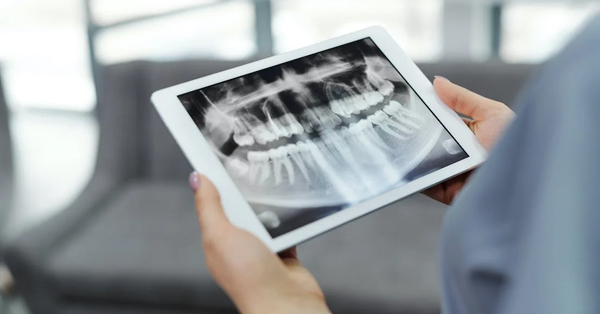When and Why Your Dentist Will Refer You to an Oral Surgeon
When it comes to the health of your mouth, it's important to know which type of professional is best suited to handle the particular issues you are facing. Dentists focus on preventative care and also do cosmetic and restorative work like fillings, bridges, and even teeth whitening. On the other hand, oral surgeons are highly-trained specialists who concentrate on surgeries of the face and jaw. The two work together, and dentists will often refer patients to an oral surgeon if there is a problem that needs more advanced care.
In this article, we'll explore a few of the most common reasons your dentist may refer you to the specialized care of an oral surgeon.
-
Removal of impacted teeth
Removing impacted wisdom teeth is a common procedure in most oral surgeons' offices, but impaction can occur in other areas of the mouth as well. Impaction happens when a tooth doesn't fully erupt from the gums. The most common causes of impaction are crowding or lack of space.
The third molars, often referred to as wisdom teeth, are the last to erupt and the easiest to become impacted. This can lead to adjacent tooth decay and gum disease, which is why dentists will often refer patients to an oral surgeon to take care of the problem.
-
Facial pain and jaw issues
Facial pain, popping sounds, and headaches are common symptoms of temporomandibular (TMJ) disorders. This joint connects the jaw to the skull. Research shows that about 5%-12% of the population suffers from it. Other jaw and joint disorders, either caused by accidents or present at birth, are common sources of oral surgeries.
Depending on the severity of the problem, there are different options for surgery - some ranging from minimally invasive (arthrocentesis) to full-on open joint surgery.
Because this is a focused area of the face, it's important to have an oral surgeon evaluate and perform any procedures necessary. They have the advanced training and surgical knowledge to help alleviate pain and resolve jaw issues.
-
Dental implants
Dental implants are a surgical procedure that replaces the root with metal rods. Artificial teeth can also be added to aid in function and add a natural appearance. Because this is a surgery, it's important to work with an oral surgeon in order to achieve the proper placement of the implants. Oral surgeons have experience dealing with the ins and outs of implant work and are also well versed to deal with any complications or issues that may arise.
Dental implant surgeries have increased in recent years because they are a solid alternative to dentures. Ill-fitting dentures can cause pain and various other dental issues, making implants a more desirable choice for many.
-
Snoring and Breathing Issues
Snoring is an uncomfortable and troubling sleep disorder that disrupts sleepers, or their partners. Snoring occurs when tissues in the throat relaxes enough and partially blocks the airway causing a vibrating sound, which can be soft or loud. Contrasted with sleep apnea, which is characterized by pauses in breathing or shallow breaths during sleep and may or may not be accompanied by snoring sound. Both conditions are potentially dangerous.
While the first step to eliminate the problem often comes in the form of weight loss, patients may also need to use a CPAP machine at night to help them breathe more easily.
For many people, snoring and sleep apnea may sound the same, but the two are different and it is sometimes possible to eliminate the snoring, yet have the characteristic stopping-and-starting of breathing during sleep of the sleep apnea persist. For this reason, a sleep analysis is recommended first.
Oral Surgeons get involved in severe forms of snoring. Usually after sleep analysis, the oral surgeon assesses the patient's breathing obstruction and then if needed, perform surgery. Traditional surgery involves removing excess tissue near the throat. However, advances in the field of oral surgery now allow for excess tissue reduction to be done in office with the use of a laser. With no cutting or recovery period involved, snoring sufferers now have a much easier path to good sleep and health.
-
Cosmetic or reconstructive surgeries
Oral surgeons also work on correcting jaw and facial issues due to accidents, deformities, or traumas from pathology removal. These surgeries can often involve the restructuring of bones, tissues, and nerves. Extensive training, clinical practice, and years of study are needed to perform these complex procedures.
Some examples of these surgeries include cancer treatment and the removal of tumors, cysts, and lesions, along with cleft lip and cleft palate surgery.
-
Bone grafts
In order to support dental implants, a healthy jaw bone is necessary. Because of this, many oral surgeons recommend bone grafting before a patient receives their implants. This ensures there will be enough healthy bone in the mouth to secure the implants. Many patients looking to get dental implants do not have strong enough gums, so bone grafts are needed.
Bone grafts require the transplant of tissue, either from the patient or a donor, to initiate growth where bone is absent or limited. The procedure is a common one in oral surgeons' offices, and they are able to leverage proven techniques to help encourage bone growth.
In addition to the procedures performed above, oral surgeons are also knowledgeable about general anesthesia, as many extensive surgical procedures may be better performed while the patient is asleep. Prescribing medications is another big job of oral surgeons. Depending on the extent of the surgery, surgeons will determine the level of pain management needed to ease patient discomfort while keeping them safe.
While your dentist is generally looking out for the health of your mouth and trying to prevent tooth and gum disease, there are some situations where an oral surgeon is needed. If you're looking to get more information about Oral Surgery DC and the types of procedures we perform or how we can assist you, contact us today.






4.9 Stars
based on 134 reviews
5 Stars
based on 11 reviews
5 Stars
based on 11 ratings